Why CCP haven’t stopped trying to make an EVE Online shooter for 15 years
First Person Shooter #FirstPersonShooter

At this year’s EVE Fanfest, the annual convention celebrating the 20-year-old space MMO, Icelandic developers CCP announced a new game: EVE Vanguard. A shooter set in their gunmetal grey sci-fi universe, Vanguard puts you into the shoes of mercenaries, dropping onto planets to retrieve equipment from wrecked ships, battling it out with AI-controlled pirates and other squads of human players. It’s Escape from Tarkov by way of the galaxy of New Eden.
If you’ve followed CCP, you may get a sense of de ja vu. This isn’t the first time the developers have tried to make a shooter happen in EVE Online: it’s the fourth. It’s just they’ve only gotten one out the door before.
In 2014, CCP released Dust 514, a Battlefield-like big team shooter, where players would fight on the surface of one of the many planets dotted across EVE Online’s New Eden. The exciting sell was that players in the MMO could bombard the battlefields of Dust from orbit with their spaceship’s lasers. One of the weaknesses of Dust 514 was that it was a PS3 exclusive, whereas EVE Online was strictly a PC affair. It also didn’t help that it was released just six months before the release of the PS4, and CCP never ported it over to the new console.
To see this content please enable targeting cookies. Manage cookie settings
Following those setbacks, CCP announced their next shooter, Project Legion, that same year, a PC shooter made by the same Shanghai team making Dust. At the time, the creative director of CCP Asia, Atli Mar Sveinsson, said that Legion was “moving more towards the DNA of CCP – give players a set of tools and then be surprised when they use those tools in strange and interesting ways”.
But we never saw Legion in action. Two years later, in 2016, CCP ceased development on Dust 514 and Project Legion and immediately announced a new shooter project “without the limitations of technical debt and development paths”. That new game was Project Nova, a team-based shooter where mercenaries fought each other inside the bellies of some of EVE’s ships; despite this the game was only set in EVE, not connected to it.
The project’s director, Snorri Árnason, said the team’s focus was on making a “good shooter first” before considering connecting the games up like in Dust 514. “If you have a great game first, then you can connect them thematically, then socially, economically, and finally you can start talking about crazy ideas like taking over a Titan [the largest spaceship class in EVE Online] from the inside.” (Steve Messner was unimpressed by an early version of Nova.)
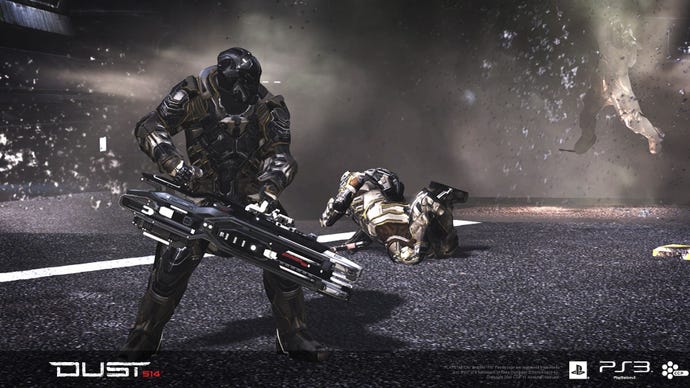
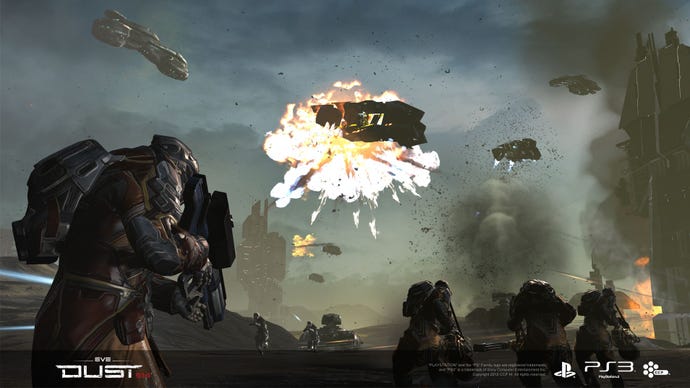 Promo shots for the console-only Dust 514 | Image credit: CCP Games
Promo shots for the console-only Dust 514 | Image credit: CCP Games
Four years later, in 2020, that project was shuttered. The development of a new shooter shifted to the recently opened CCP London. “Due to significant changes in the scope and direction of our sci-fi multiplayer shooter game concept, it made sense to update how we refer to this project internally,” CCP’s head of PR, George Kelion, wrote on Reddit. “So, we are no longer using the codename Project Nova for this game concept.” That new shooter was to become the newly-announced Vanguard.
Further explaining the decision at Fanfest last year, CCP’s CEO Hilmar Veigar Pétursson said, “Dust was overambitious and broad, tried to achieve many things, compromised on some of them. Nova was very focused, perhaps too focused. It didn’t seem like it was going to be a project that we wanted to carry further. Our London project is very much informed by all those efforts. Maybe this one is somewhere in the middle.”
“It was clear we were trying to make a game to compete with Destiny, and we wouldn’t be able to do it.”
But, even within Vanguard’s development, there seem to have been major shifts in exactly what CCP are attempting to achieve with an EVE shooter, as they significantly redirected the project at the start of this year. “In December, we sat at the table [and looked at the game], and we weren’t super happy with what was being made at that point,” CCP production director David Ecker says. This earlier version of Vanguard was a standalone shooter set in the EVE universe; it drew from the sci-fi’s narrative and aesthetic, putting you in the boots of a soldier surrounded by the same warring factions of New Eden, but, unlike Dust 514 and Legion before it, there was no attempt to connect the two games, or allow you to influence the action in the MMO.
However, Nova’s former director, Snorri Árnason, now EVE’s game director, saw a problem: “It was clear we were trying to make a game to compete with Destiny, and we wouldn’t be able to do it.” Bungie has spent nearly a decade developing Destiny, broadening its scope to cover a multitude of planets, and stuffing its armoury with guns. On day one, Vanguard ran the risk of being how Messner described Project Nova – “little more than another generic sci-fi shooter”, and one that was far less rich than the competition.
“I’ve played Call Of Duty since the dawn of time,” Ecker says. “You’re a purist with that kind of stuff.” It’s where your friends are, where your character is, and where you’ve amassed all your progression and collectables. As Ecker puts it, it feels like “you’re contributing to something more,” making it very hard to coax players away. “We didn’t have that when we were doing Vanguard and EVE in their own lanes, but a light bulb went off basically that we can integrate this closer with Eve. Now that we’re putting it together, this is something that I think only we can create.”
Árnason, a big fan of Dust 514, who relocated from Reykjavik to Shanghai to work on the shooter as a senior producer before leading Project Nova, supported pairing the two games: “The EVE connection has always been the unique thing. Not 20 weapons or 50 levels or tanks and space.” Though, Árnason is also well aware of the risks. Speaking about Dust 514 to Jeremy Peel back in 2016, while promoting the much-trimmed down Nova, he said the PS3 shooter’s biggest problem wasn’t the platform; it was that it “It failed to contain scope, and delivered too many average features instead of few top quality ones”.
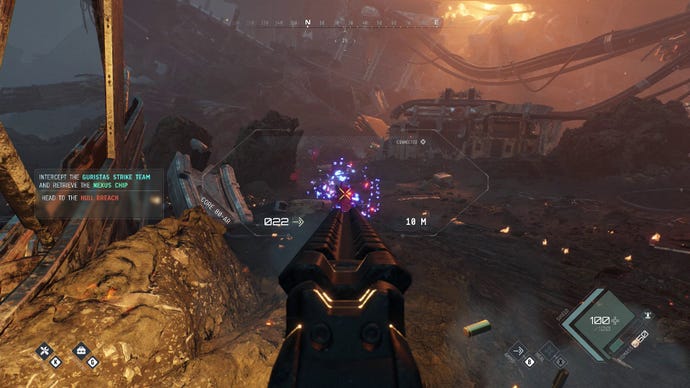 Image credit: CCP Games
Image credit: CCP Games
While you could see turning the standalone Vanguard into a game that connects into EVE Online as an expansion of scope, Árnason disagrees, saying, “When we finally found the heart, and that’s the sandbox, moving on became so much easier. It relieves a lot of pressure; we’re not competing against Destiny; we can be up there on the quality but not necessarily the width. We’ve seen a lot of forward momentum since that decision.”
After the decision in December to join Vanguard to EVE, the team had to take a step back before they could move forward. “You can’t build a separate game and then smash it into another game and expect it to work,” Vanguard’s lead game designer Gavin Skinner told me. When he joined in April this year, “[Vanguard] was in bits. We had core mechanics – moving and shooting – and it felt good. Guns felt impactful. But we had a lot of stuff from previous iterations; there have been three or four versions of the game.” The team have spent most of 2023 paring the game back and rebuilding from its new foundation, Skinner says, conscious of “how it would tie into EVE from day one.”
This December will see EVE subscribers invited to play Vanguard in a limited-time First Strike event, and it is more proof of concept than a server stress test. It will only have one map, one gun, and a couple of contracts for players to experience. “We have a million ideas and hypotheticals for Vanguard,” Ecker says. “But this December test is really going to be, ‘Okay, we took the first step, did we take the first step in the right direction?’”
“That’s why we started like we are, beginning slowly,” CCP’s vice president of product Sveinbjorn Magnusson says. “We’re working it out. We care immensely about the quality of the experience and how we build the foundations to evolve new methods to interact with the world.”
“This is a way to allow people to interact in more ways with EVE,” Magnusson tells me, explaining why the team at CCP keeps trying to make a shooter happen. “Our story of EVE is rich and fruitful and full of opportunities [but] controlling a ship is an immense job; it’s not for everyone, and people want to participate.”
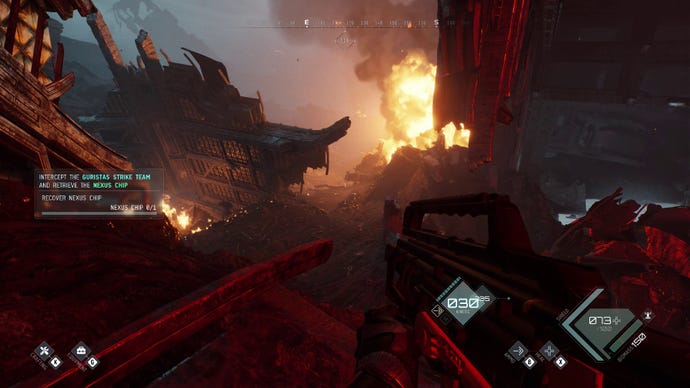
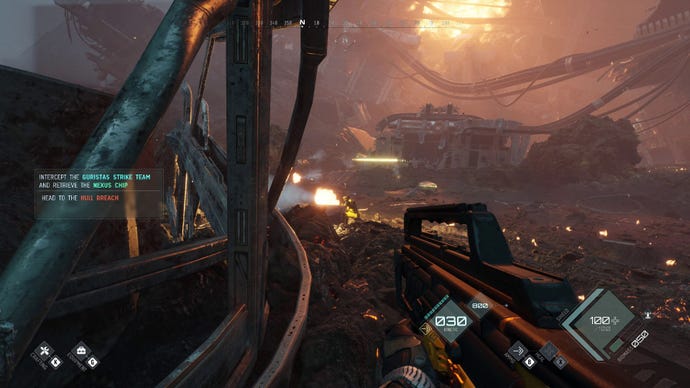 Image credit: CCP Games
Image credit: CCP Games
CCP has been working on a shooter set in the world of EVE Online for more than 15 years, and in that time, it’s managed to get one project over the line, which ran for a little less than two years before closing. As Pétursson told Jeremy Peel last year, “We’re extremely stubborn about wanting to make [this] happen”.
“First-person shooters are just way easier to get into,” Ecker adds. “You don’t need to dedicate 40 hours a week; you can play an hour session of a first-person shooter and still feel a part of the grander thing. It’s a big opportunity for someone that goes, ‘Love EVE, love everything about it, love sci-fi, but I will never play it because I don’t have [the time] to get into it’”.
The players I spoke with at Fanfest liked the gameplay shown in the keynote presentation. The live demo showed a team of Vanguard mercs dropping onto a planet where a vast space carrier, its back broken by artillery fire, lay across the slopes of a valley, innards exposed to the sky. The squad infiltrated the crash site, picking off an AI squad and finding the Nexus Chip they were contracted to salvage. They then placed an extraction beacon and were killed by another Vanguard squad before they could airlift to safety. In seven minutes, CCP showed off the game’s main loop – infiltrate, scavenge, extract – and other features, such as crafting new ammo from resources harvested from the scattered wreckage.
Attendees immediately saw how the game could fit into their EVE schedule. “With EVE, people take breaks for years or even decades before they come back and log on,” Stefan ‘Erstschlag’ Schönthal, an EVE player and streamer, told me. “Having this Vanguard FPS module as something else you could do to get your foot on the ground and shoot people with a gun. That’s great variety.” And, for people who don’t already play EVE but will start to see Vanguard appear on Twitch during the test in December, “it’s building the hype,” Schönthal says. “[A] gateway drug into EVE, so to speak.”
In 2013, I travelled to CCP’s studios in Reykjavik to see EVE and Dust link up for the first time and watch the orbital laser strike play out in a staged match. It was impressive, but as now with EVE Vanguard, CCP talked about a grand future while simultaneously stressing that what they were releasing was a deliberately small first step.
“This is important for people to understand,” CCP’s resident economist, Dr Eyjolfur Gudmundsson, said at the time. “We are not saying we have delivered everything [that Dust will be] when it has come out. This is the first step. It took us ten years to get EVE to where it is today. This is the first step on the journey of Eve and Dust together. There will be a second decade of development. It’s important that people understand that there are so many new things here that it’s not just another shooter coming out.”
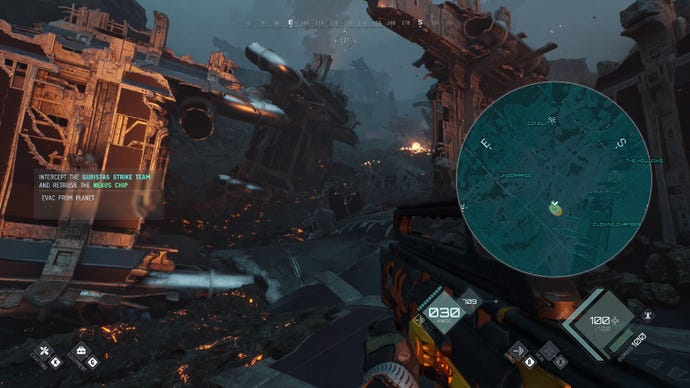 Image credit: CCP Games
Image credit: CCP Games
In the decade since my first trip to CCP, the developers have tried making an EVE-connected shooter, and tried making a standalone shooter. They’ve tried making a big team game in the style of Battlefield, with tanks and plans of VTOL jets and mechs, and they’ve tried making a small-scale team deathmatch shooter, more similar to Counter-Strike. Until recently, they were making a shooter the devs described as competing with Destiny, and now they’re making a shooter similar to Escape From Tarkov. For 15 years, CCP has been trying to find the shape of a shooter that fits into EVE Online. The team have said each time that they’ve learned lessons from the failings of the project that came before, they’ve said how powerful the universe and connection to EVE is, and why it makes their shooters unique.
I can’t say if Vanguard will be what the team’s looked for for so long, but it has two things going for it that give it a greater prospect of success. Firstly, it’s launching on PC, not a console that was due to be replaced six months later. EVE Vanguard is described by CCP as a module of EVE rather than its own game, not because they run in the same engine but because you launch both through the same client. CCP are trying hard to make sure even if Vanguard develops its own player base, they will be well aware of its ties to EVE Online.
Secondly is the ‘vE’ in Vanguard’s PvPvE’s pitch. Even if you were the only player in the world who booted up Vanguard, there would be a game for you to play. You can drop onto a planet by yourself and complete contracts, facing only AI-controlled enemies. This may be a game connected to EVE, but it’s not dependent on EVE, nor is it even reliant on there being other Vanguard players – though, the fun and fear of games like Escape From Tarkov and Hunt: Showdown comes from the knowledge another human player could pounce you at any moment. It is unfortunate, however, that after redirecting Vanguard to avoid competing with Destiny, Bungie announced its next game, Marathon, a sci-fi extraction shooter.
CCP talk about a future for Vanguard where the players on the ground act like the Marines to EVE Online’s players’ Navy. Mercenaries served contracts from players in the sky, building structures on the planet’s surface to send resources to the stars in return for supply drops for their efforts. But, as compelling an image as that is, as it was in Dust 514, Project Nova, Project Legion before, that future is over the horizon, and the focus right now, as Skinner says, is “getting it feeling good.”